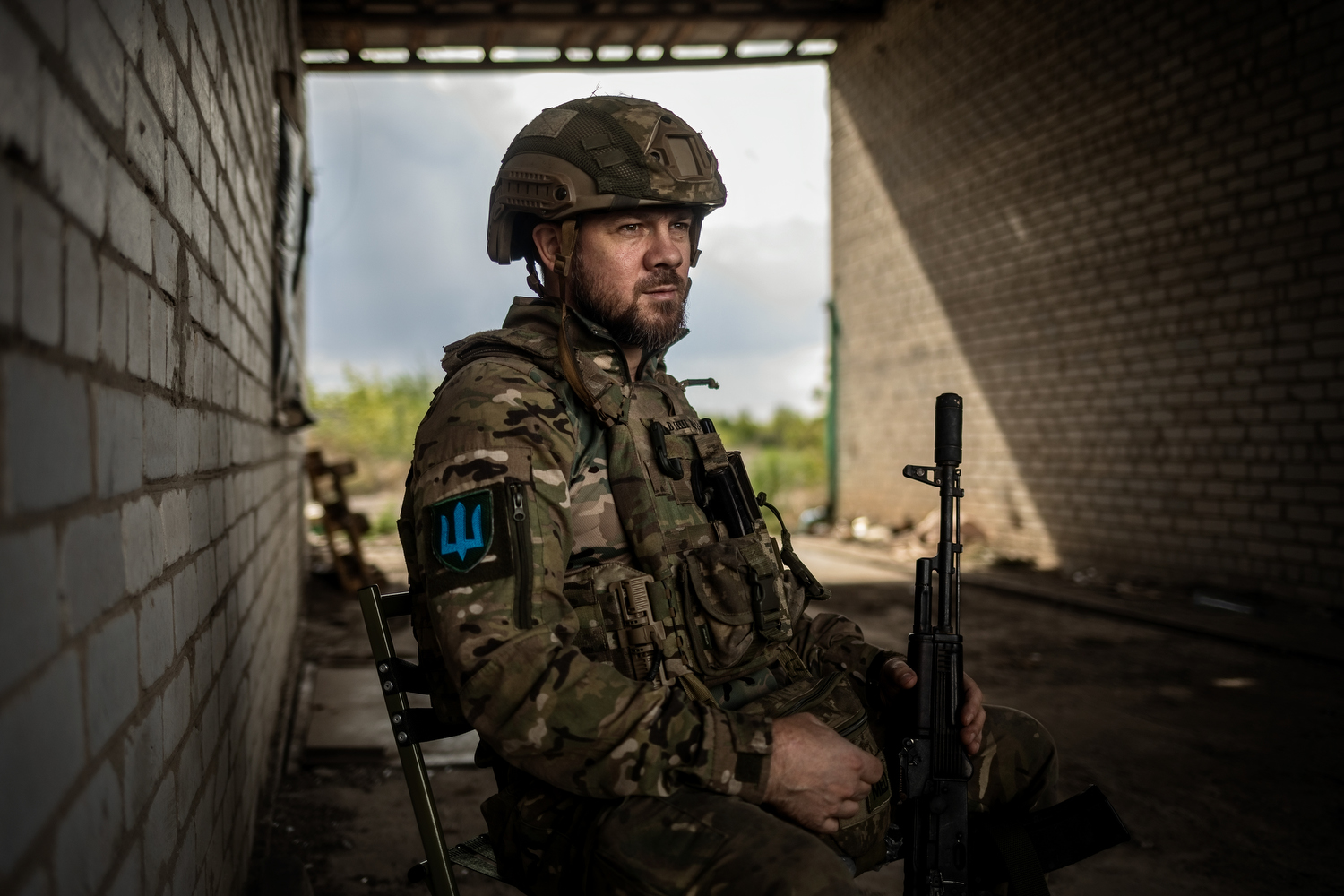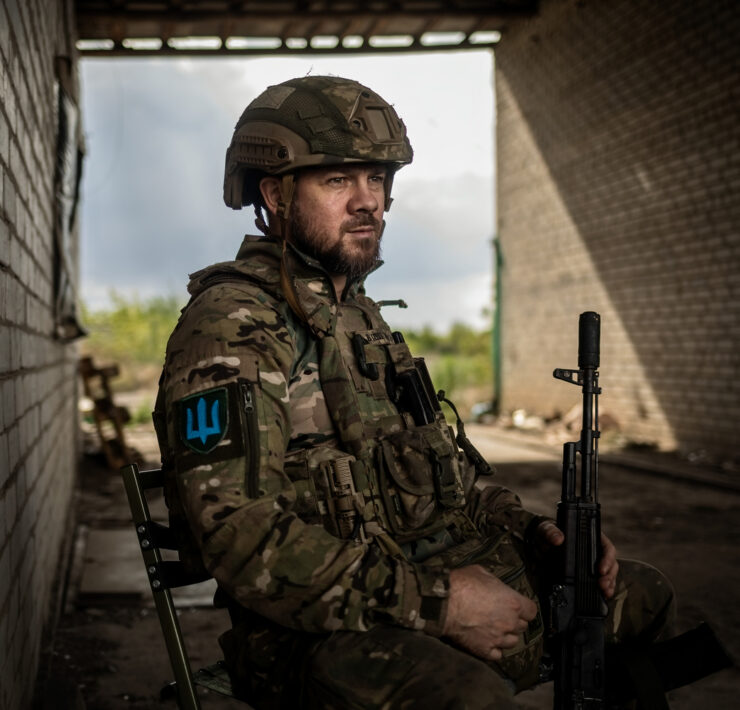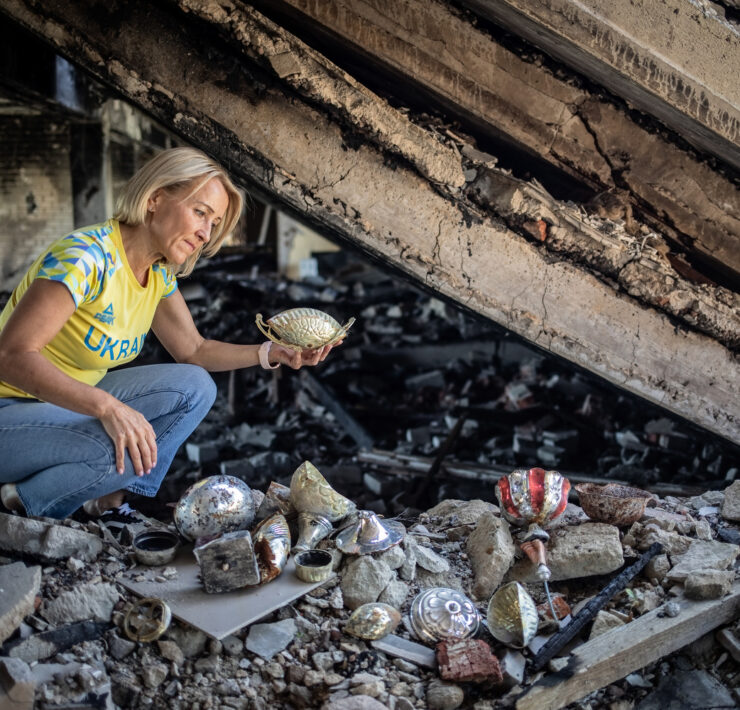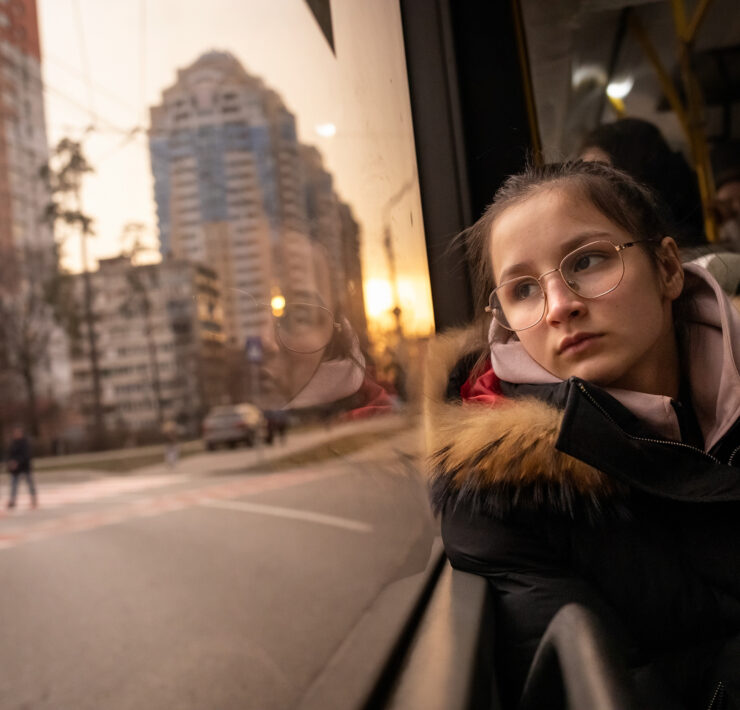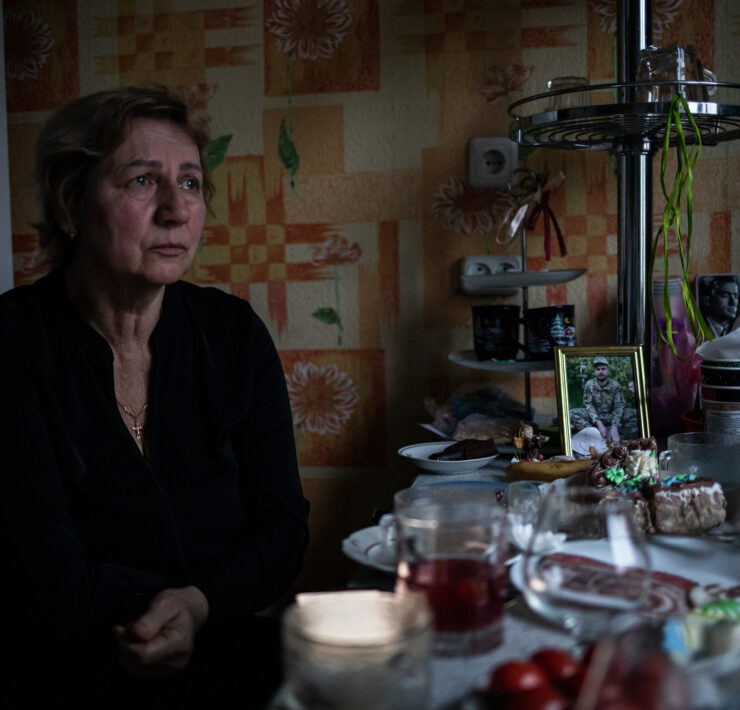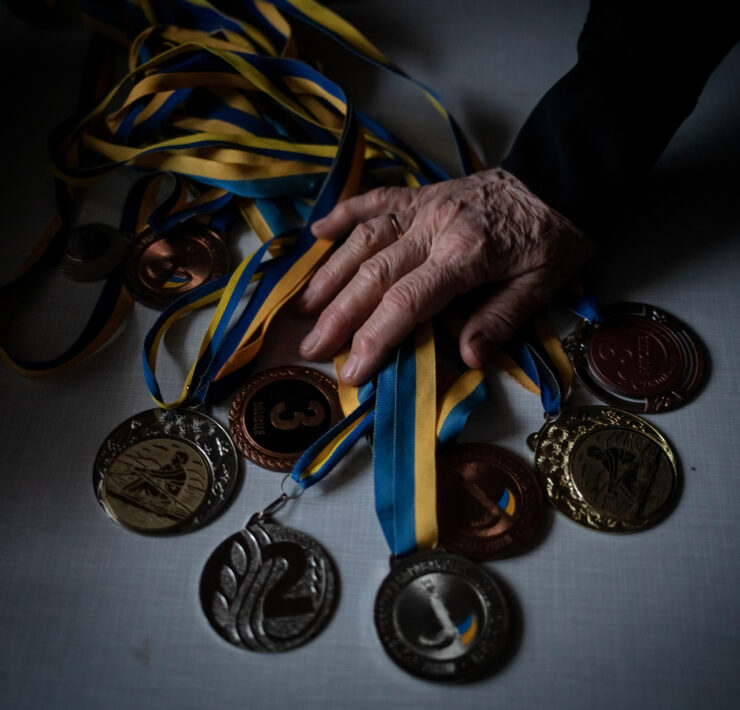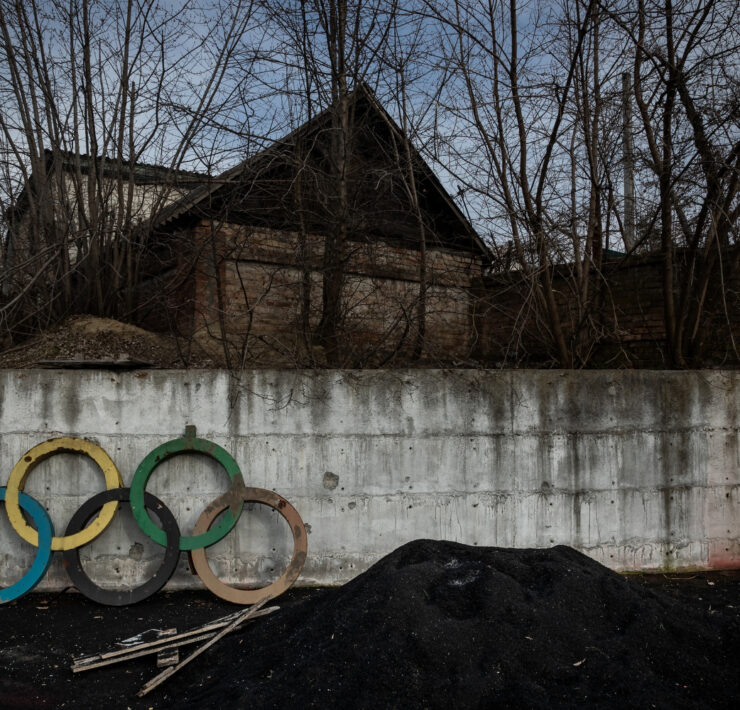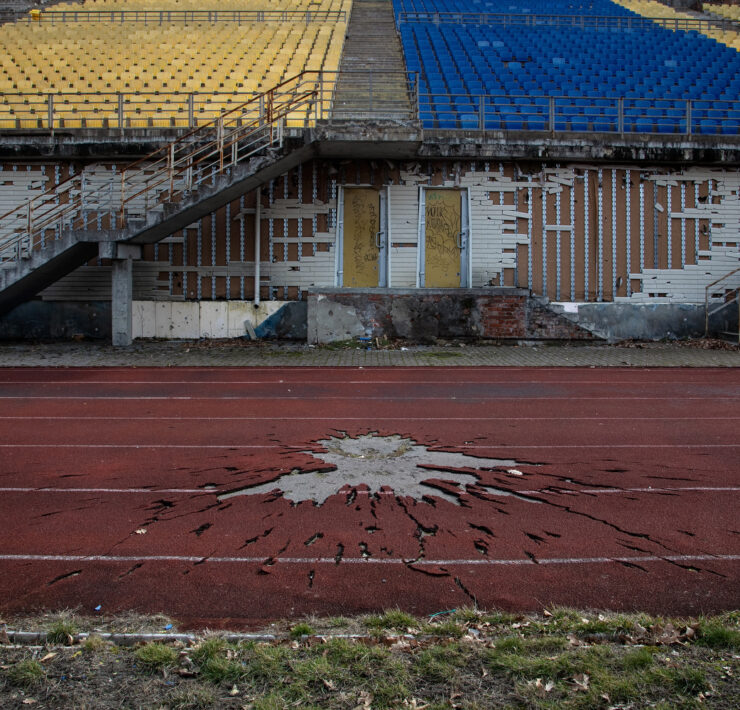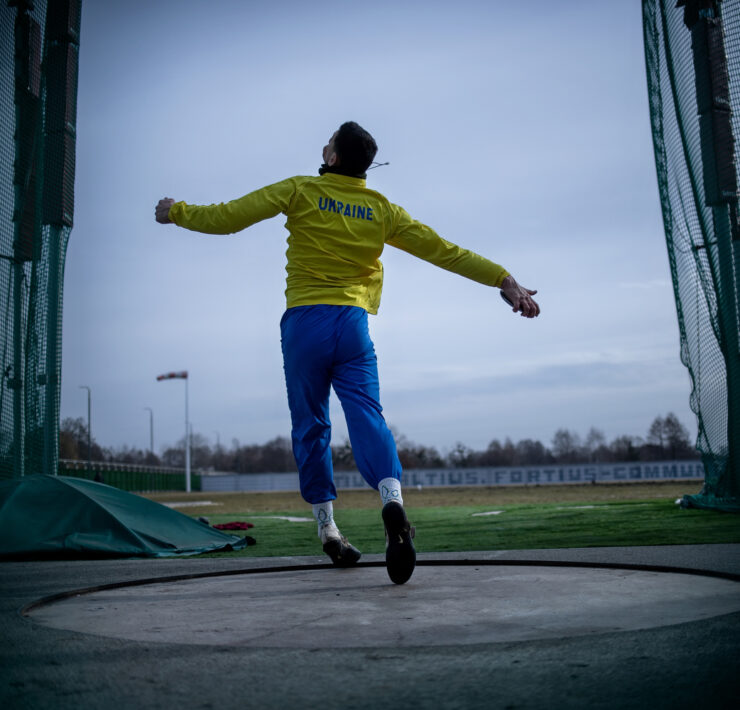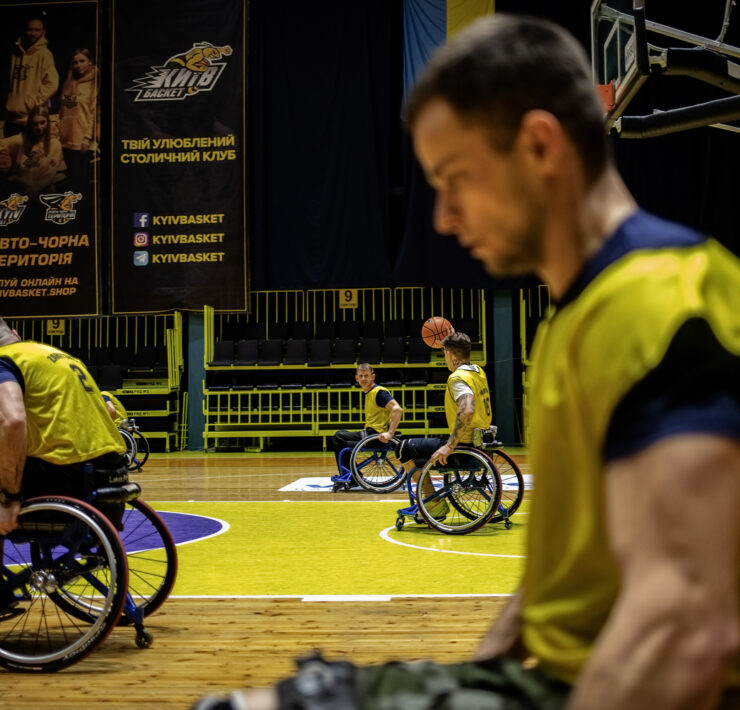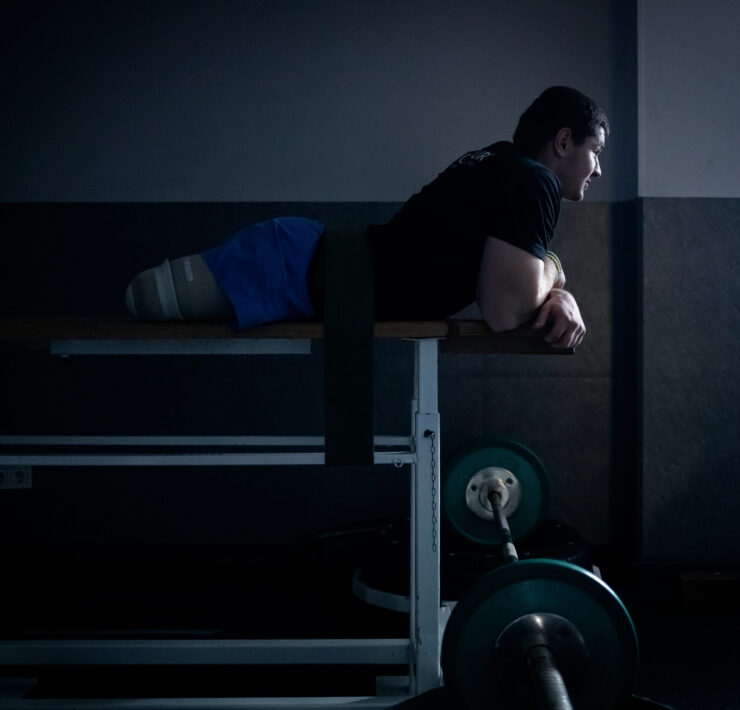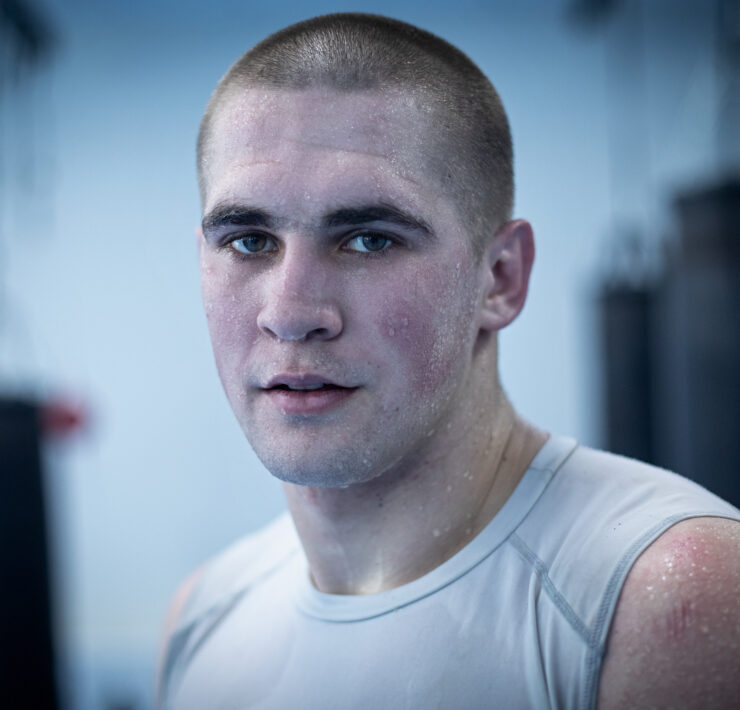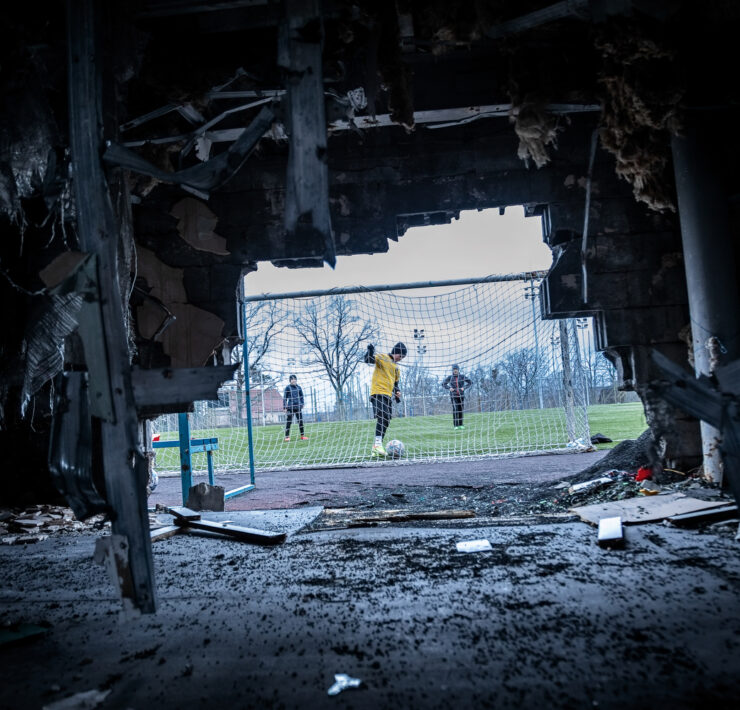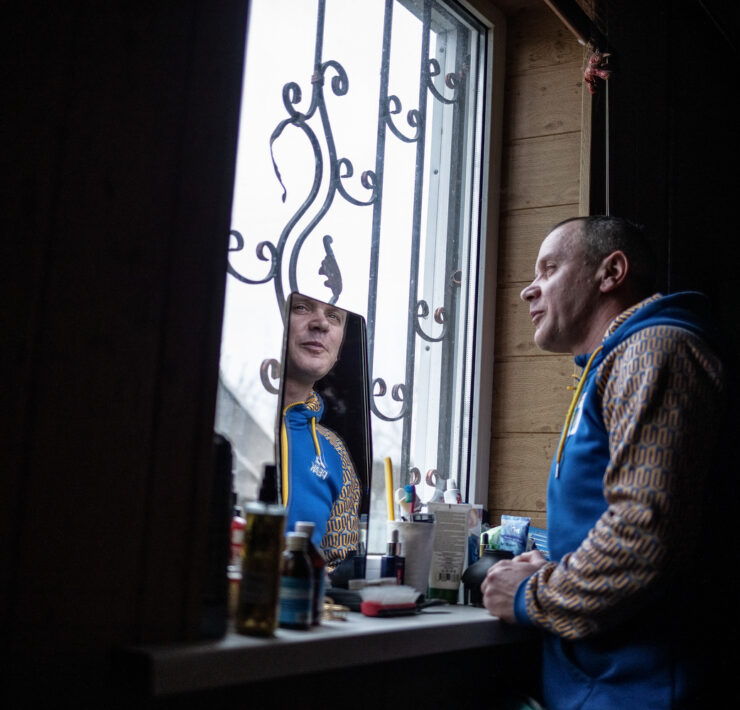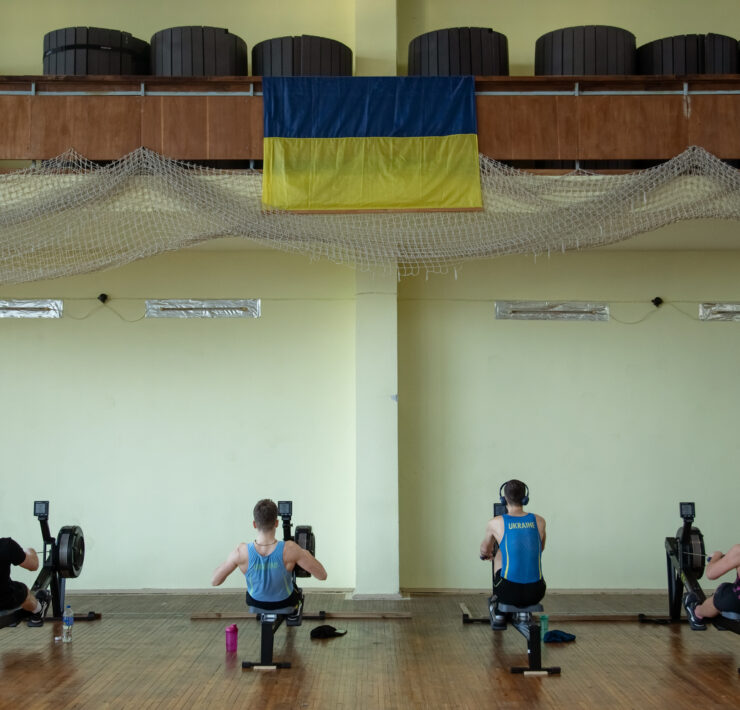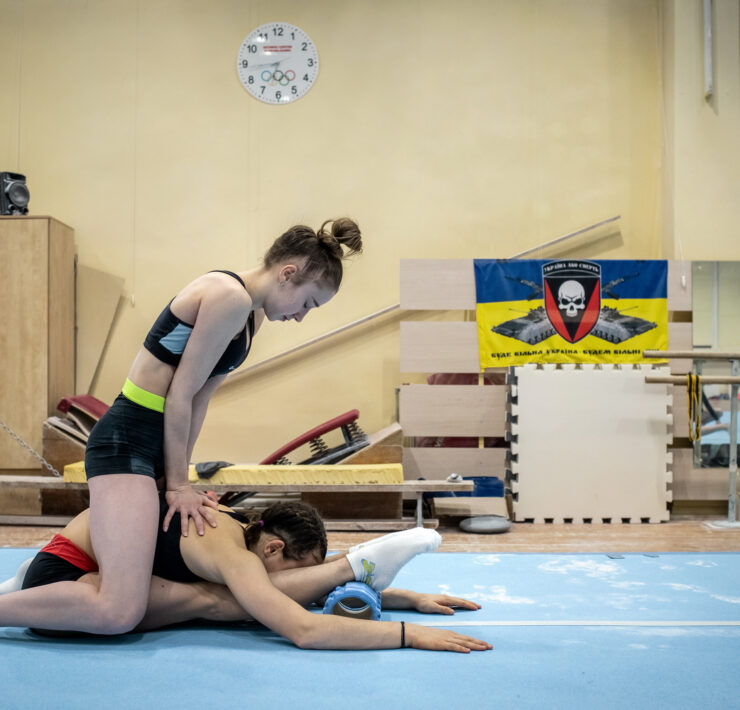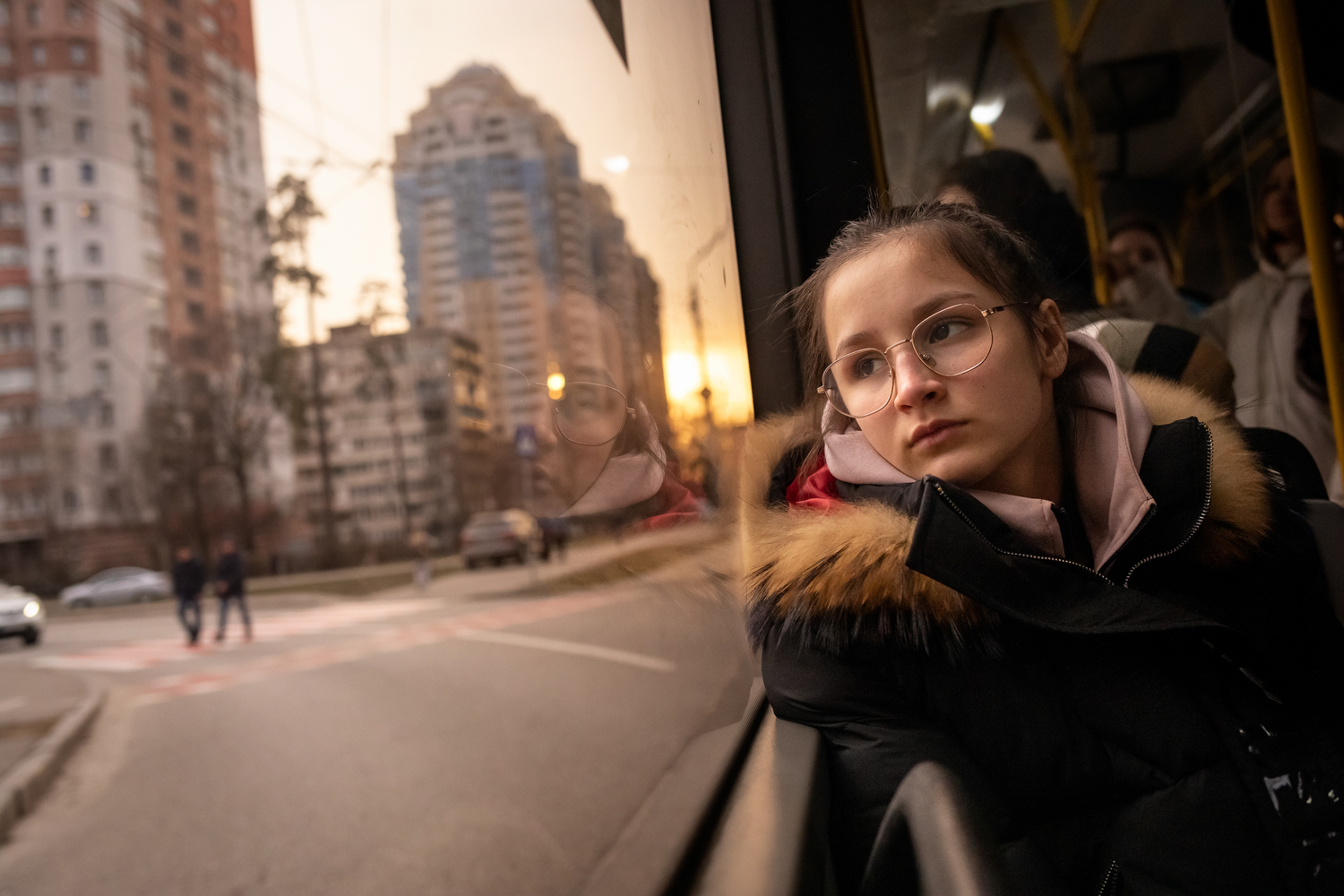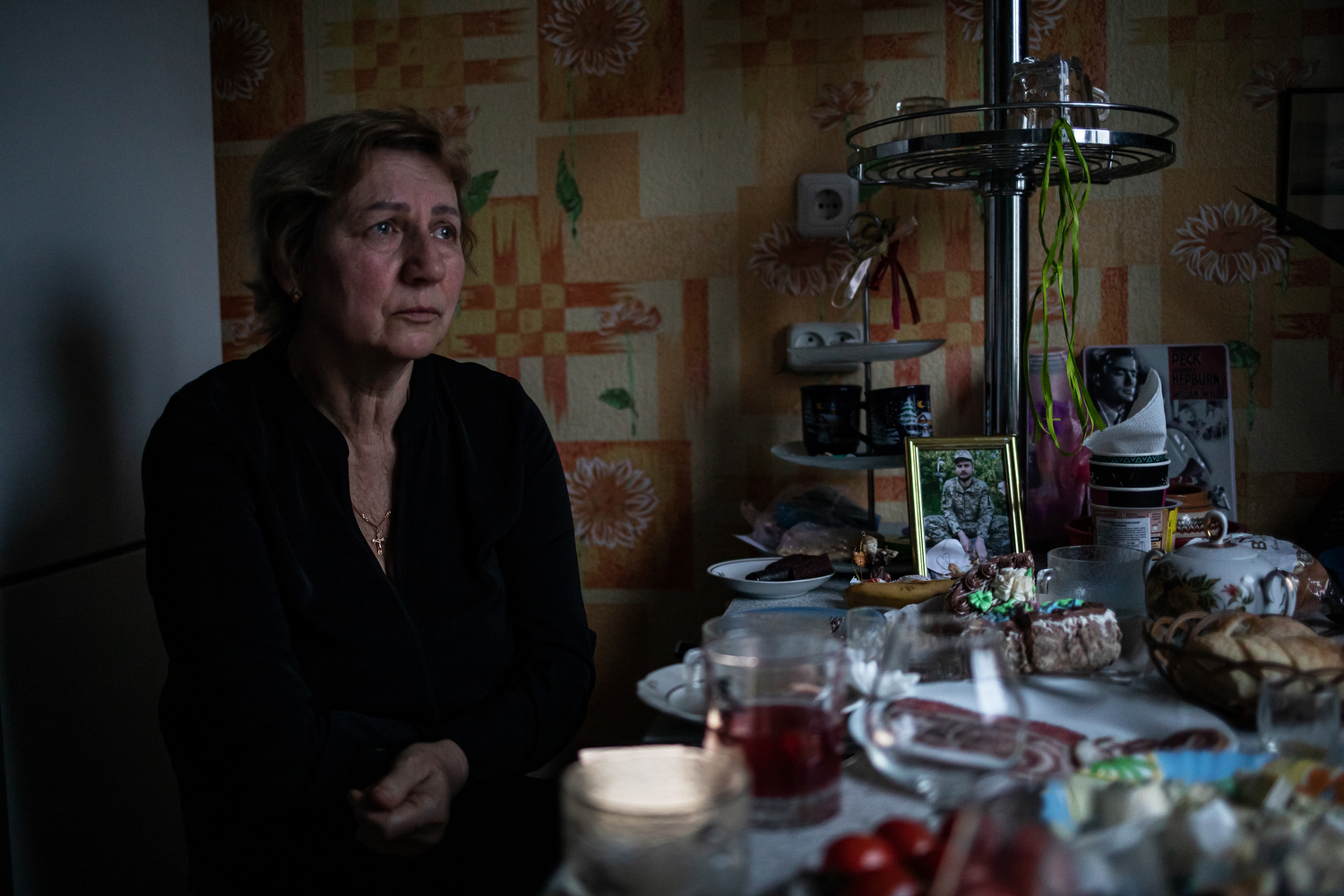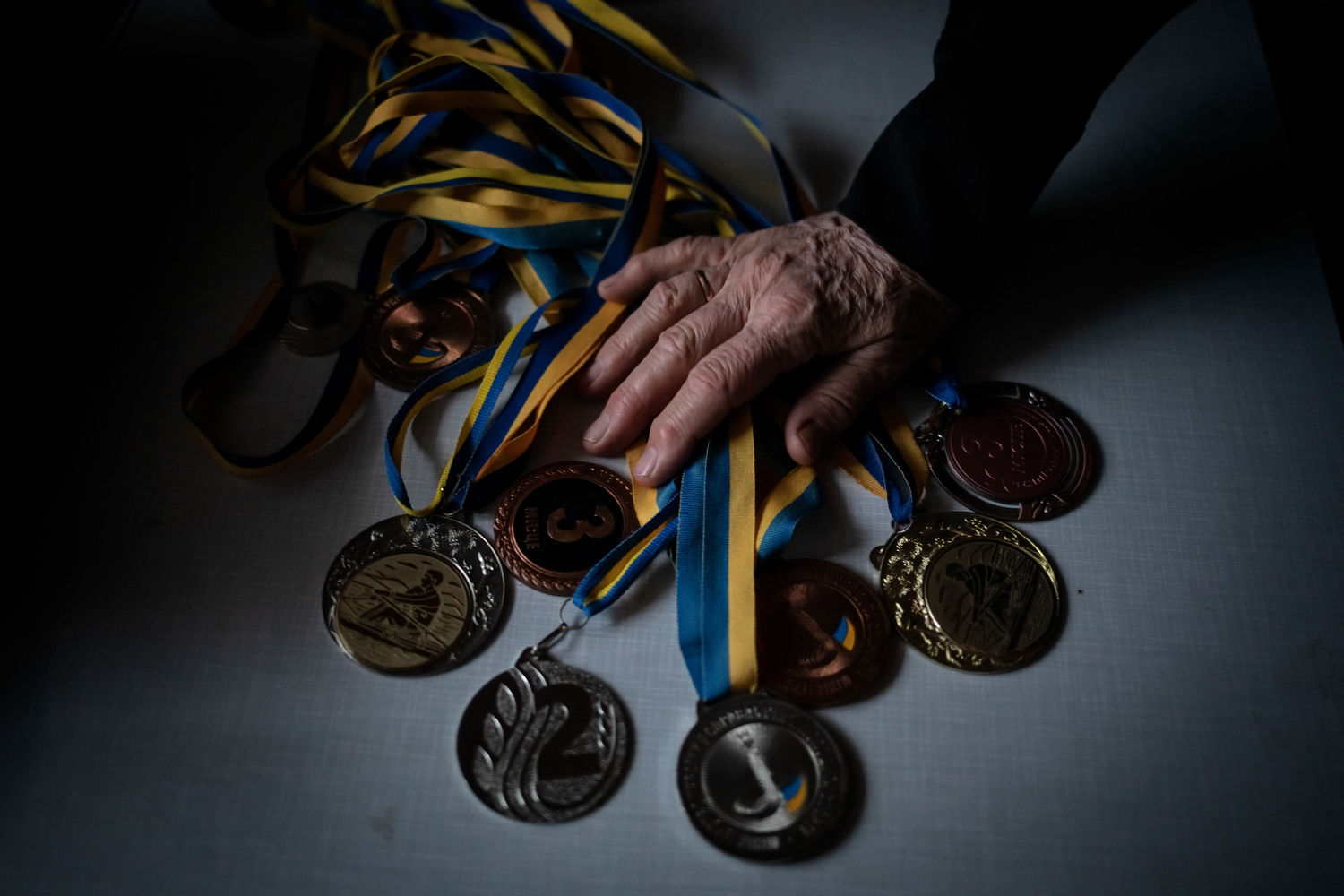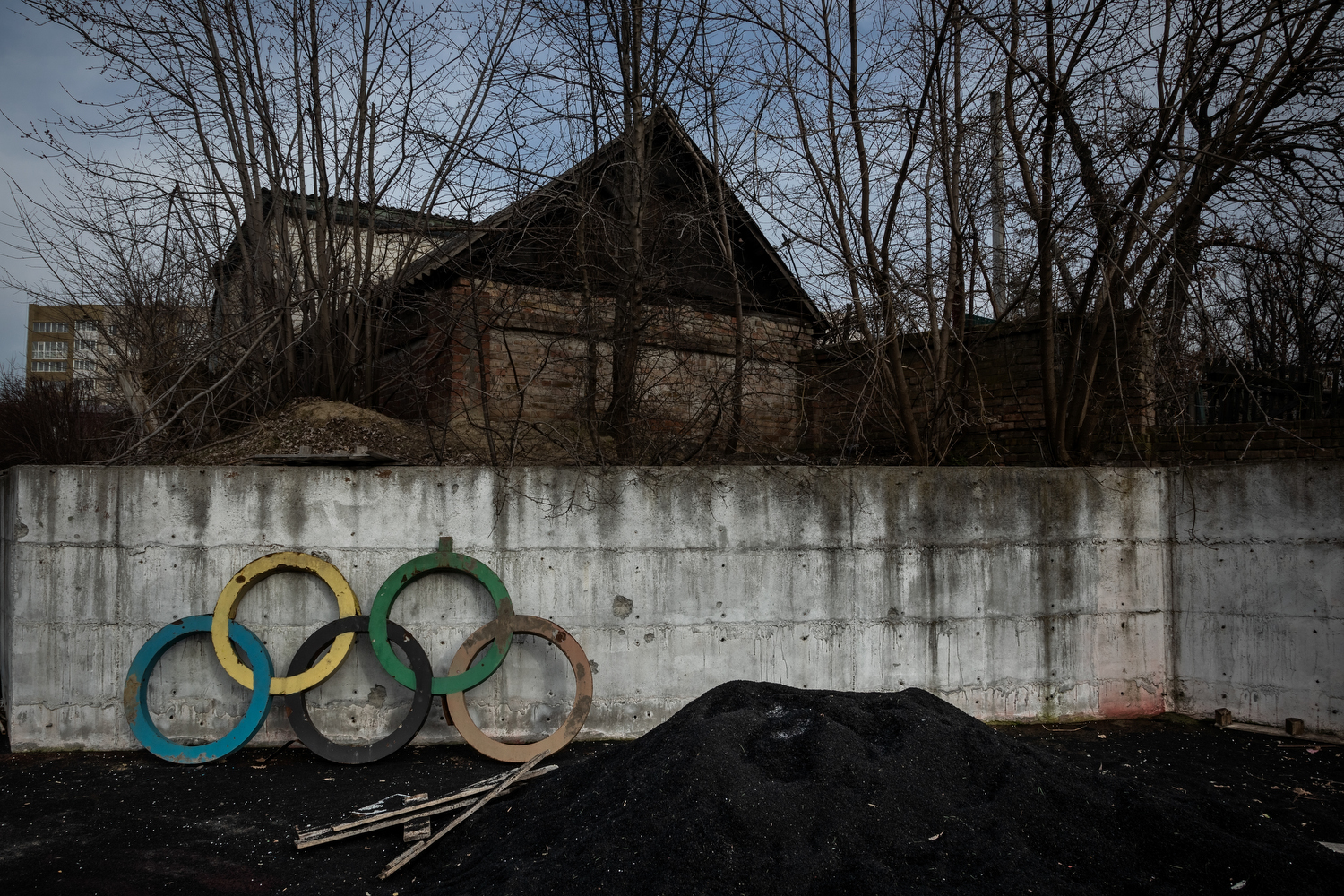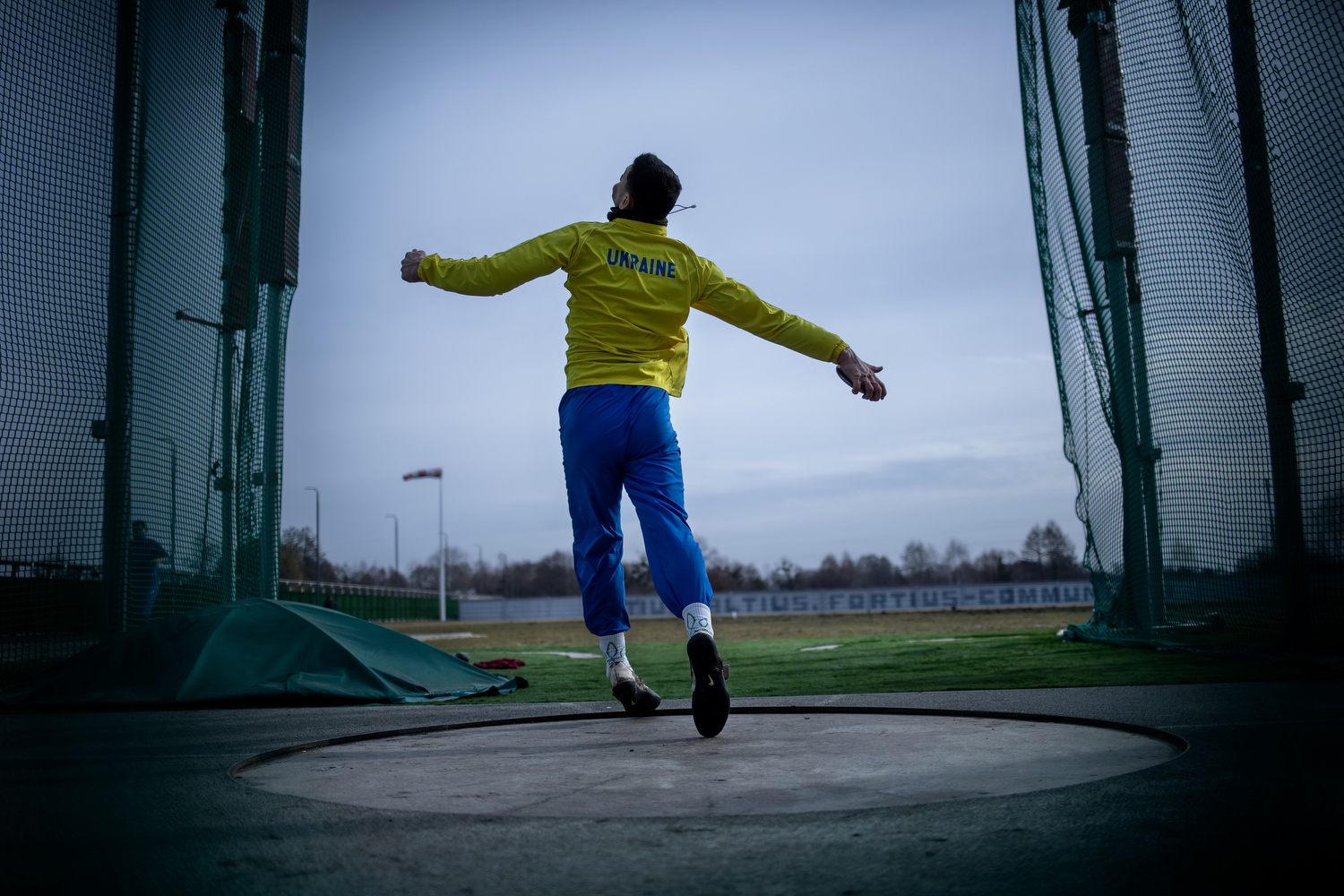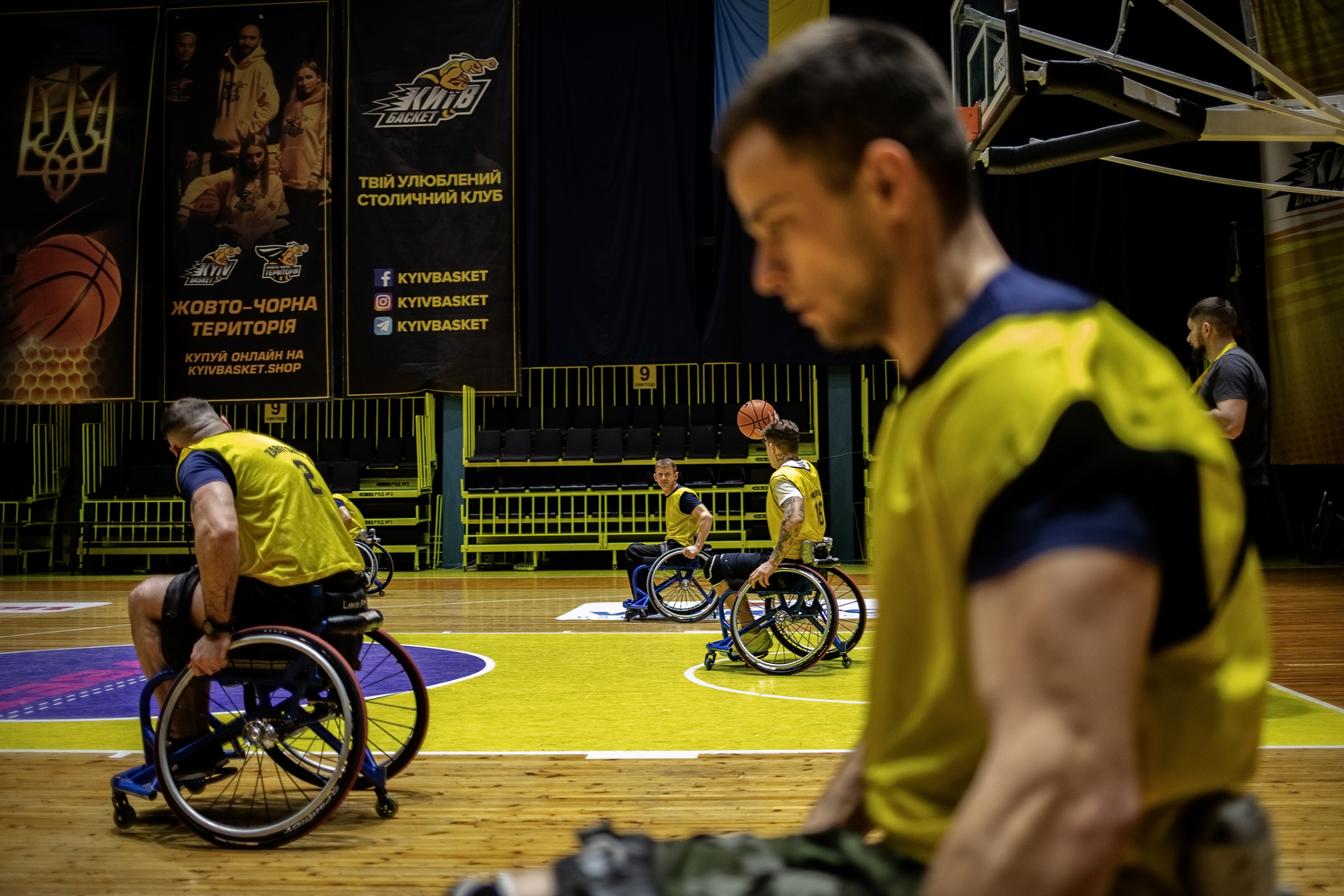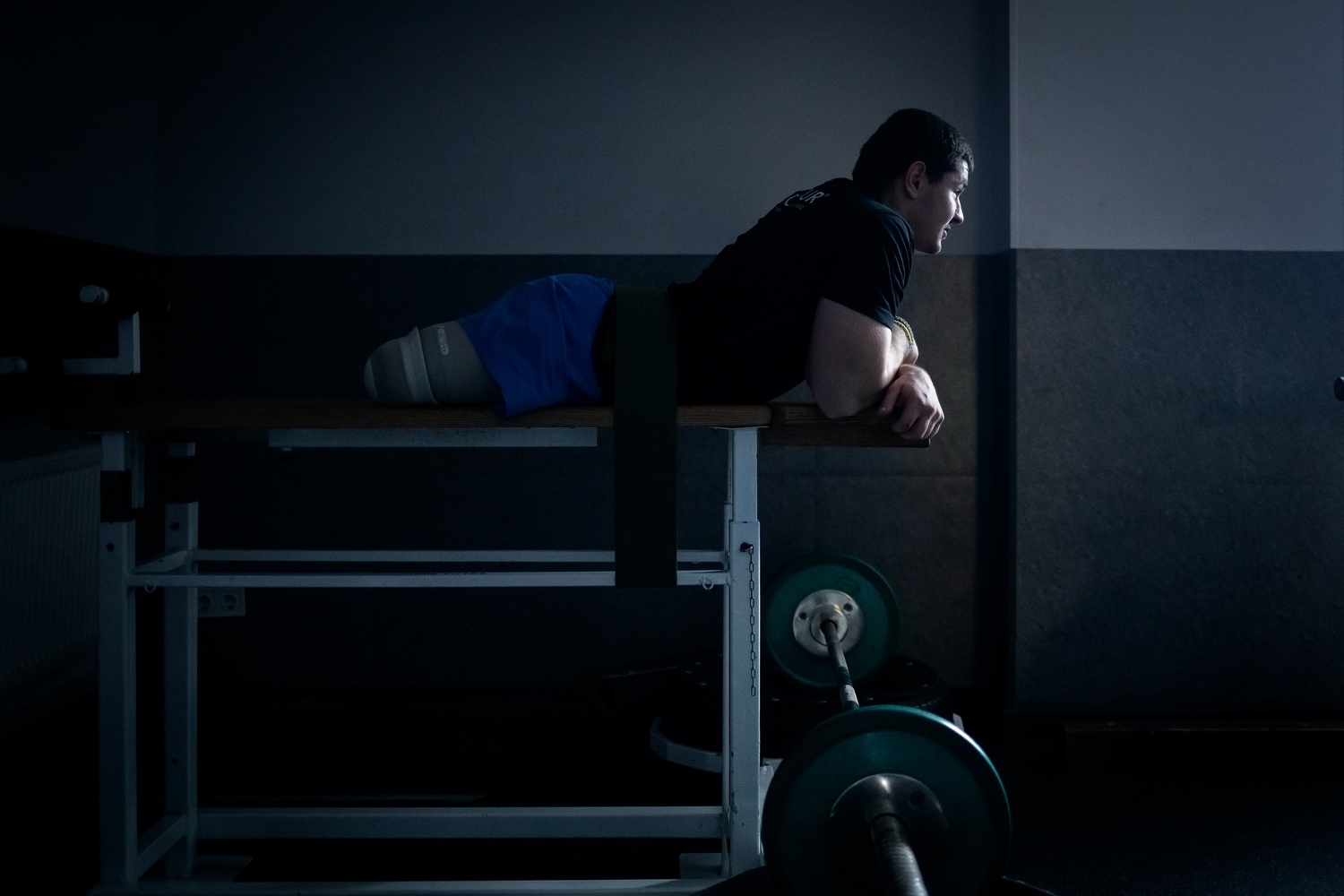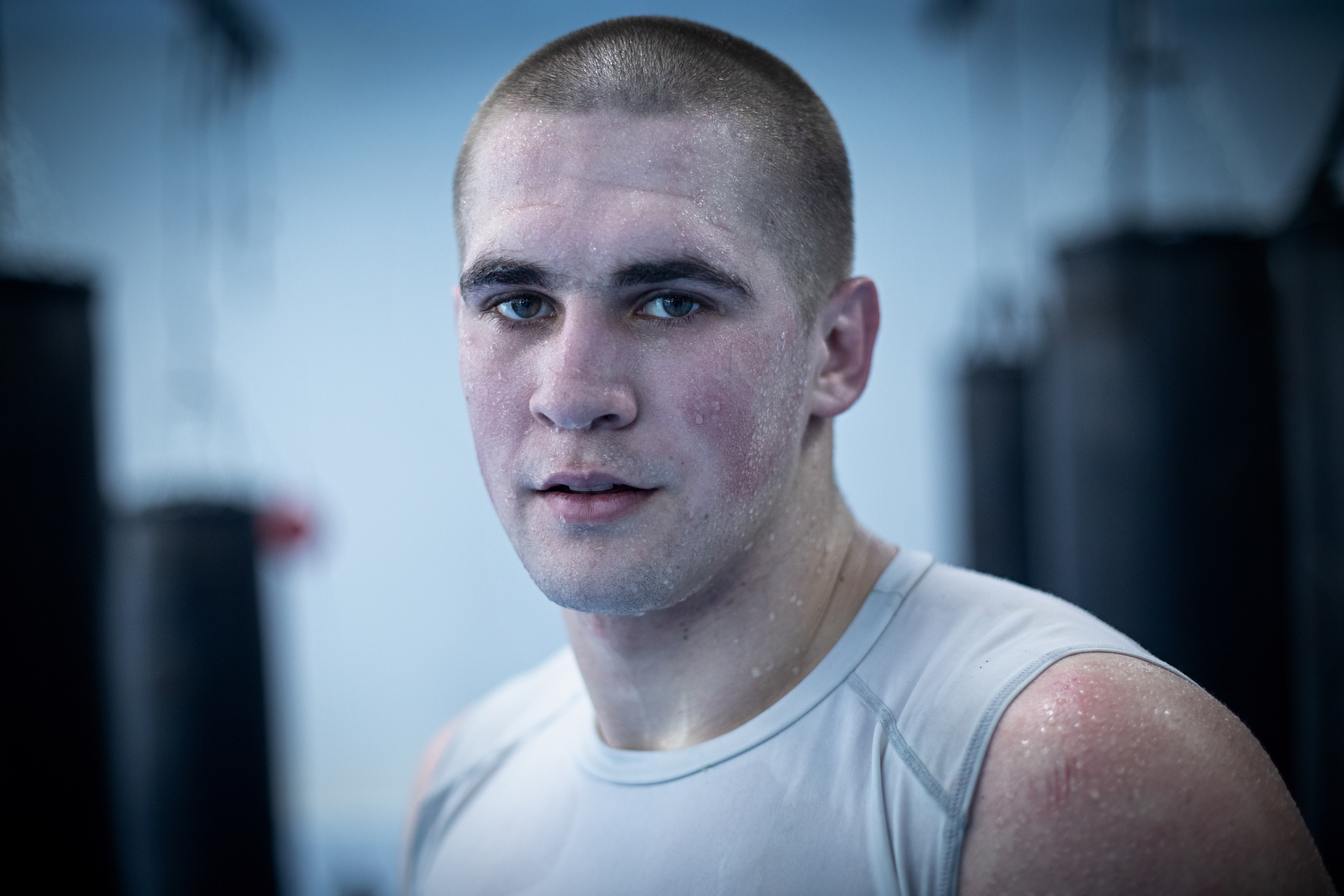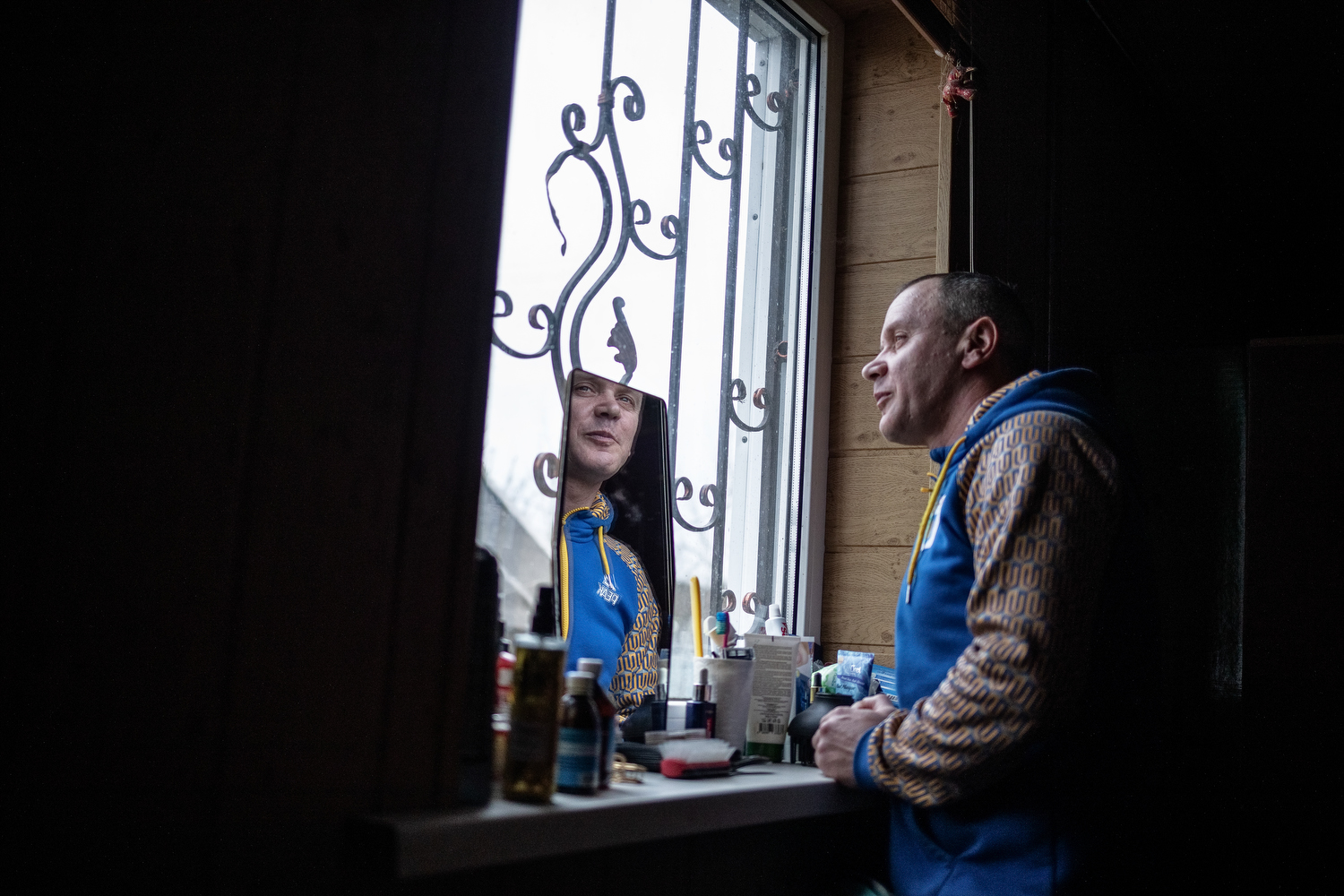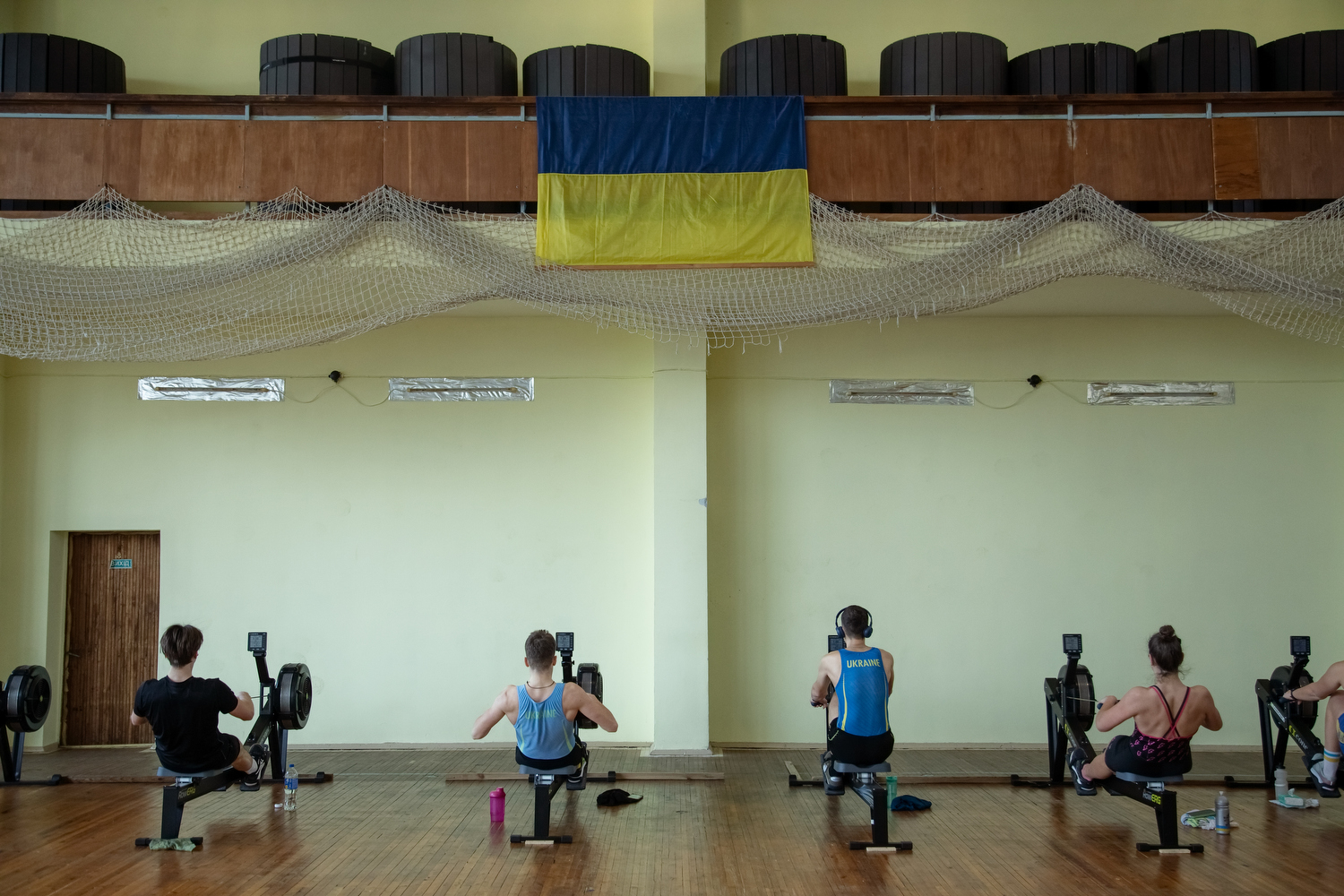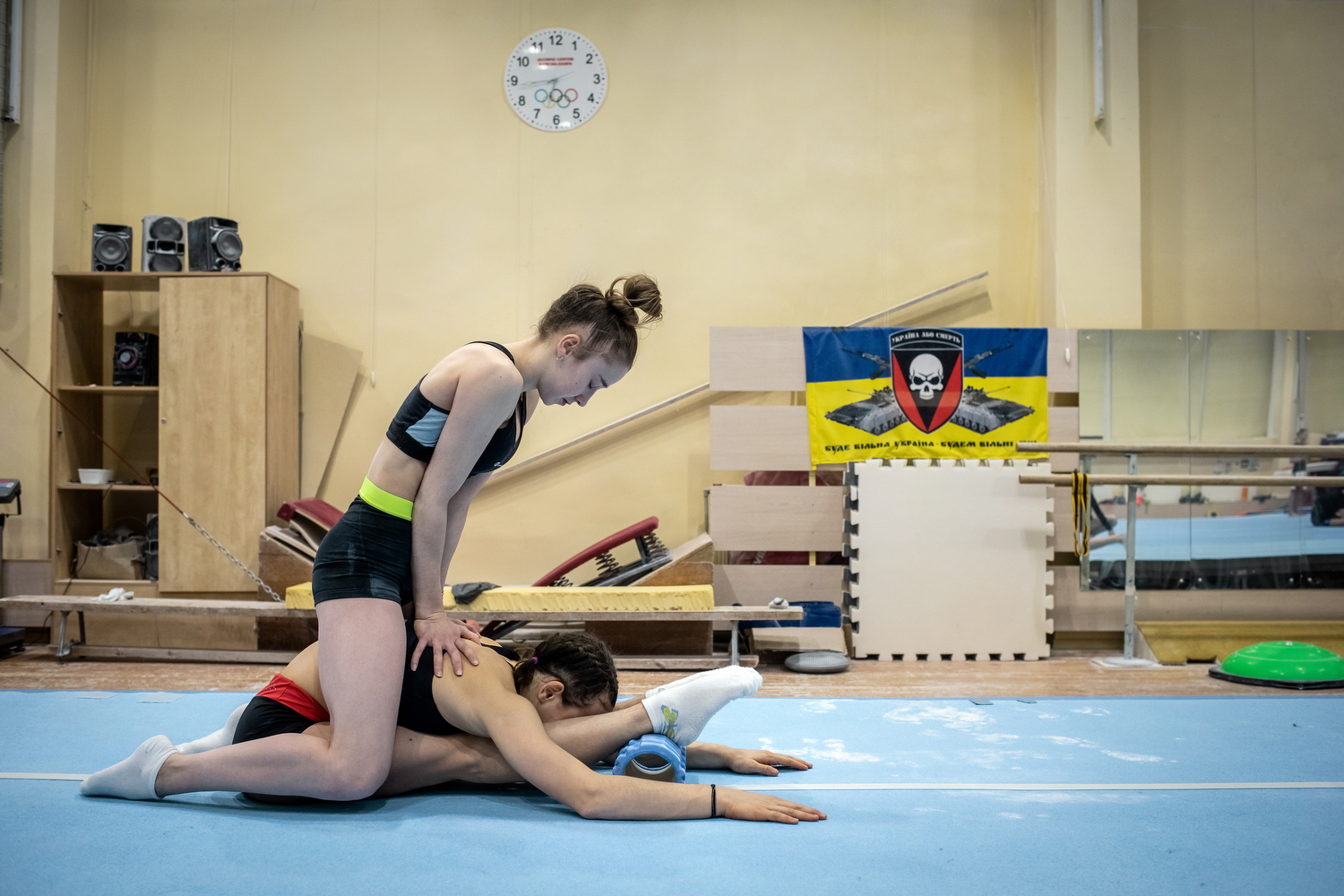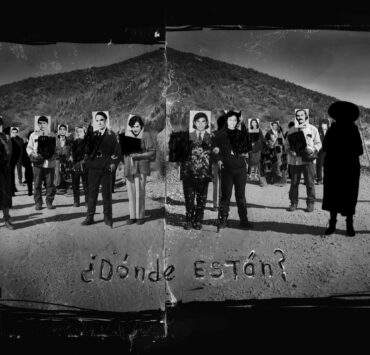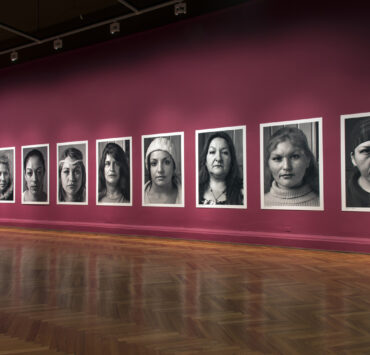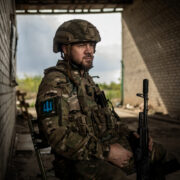
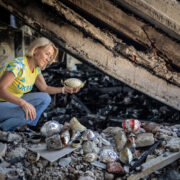
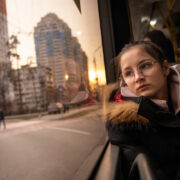
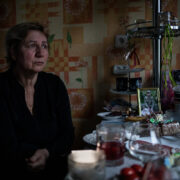 +11
+11 Susana Girón: INVICTUS UKRAINE
_AM28183-1
Ruslan Mezentsev (born 1981, Kropyvnytskyi) won a silver medal at the Sydney 2000 Olympics in the Men's Artistic Gymnastics Team event. When the war began, he decided to auction off his Olympic medal and donate the entire proceeds to the Ukrainian army, which he joined after being called up in the spring of 2023. He is now part of the mechanized troops fighting in the Donetsk region. "My reward was participating in the Olympics; the impact my medal has left is more meaningful to me than keeping it physically. After all, it's just metal, and at that time, I donated the most valuable thing I had, which was that medal. I got a little over €10,000 for it, and at the time, I had almost no savings." Ruslan had opened his gym in the city of Poltava, where he trained fitness and physical conditioning, but he no longer wanted anything to do with high-level sports. "There is no parallel between fighting and competing. Sports gave me a strong physical condition, but it also caused me significant injuries and lasting effects that limit my physical and military life. There is a lot of pressure in both the front lines and in competition, but it is different. The only thing that has helped me from my sports career in the war has been my psychological resilience: I can control my emotions better in combat. Nothing else." "All my teammates from the Olympic team left the country before the war and now work as coaches abroad. None of them remain in Ukraine. I barely keep in touch with any of them. We no longer share any common interests, and each has their own path. They have provided me with some help to cover some of the economic needs we soldiers face and that we sometimes can't meet." "Winning that Olympic medal was undoubtedly one of the most beautiful moments of my life. But being an elite athlete has also given me the hardest moments of my life; the demands of competition are inhumane due to the pressure you are under. What scares me most about the war is that I can't see the enemy. In sports, you can put a face to your opponent, but in war, you don't see your adversary; you don't see where the projectiles are coming from. It's not about physical strength or discipline; you simply shoot without seeing. Our advantage in this war is that we are defending the truth and our land, that the future of our families rests on our shoulders. The enemy's advantage is that they have more soldiers and more weapons. We can only defend ourselves under these conditions."
Susana Girón: INVICTUS UKRAINE
_AM27951-2
Nina Lemesh, 51, is the head of the Regional Biathlon Federation in Chernihiv. She herself trained and lived at the Chernihiv biathlon base for more than 10 years. During her time as an athlete, she became a European Champion (2006) and won three medals in World Championships and six medals in European Championships. She now represents the National Olympic Committee. Nina Lemesh searches among the ruins of the Olympic base for some of the sports trophies won by the many athletes who trained there. For her, it is extremely difficult to see this devastation at the place that was her training ground for so many years. She is calling for international help to restore their lives to what they were before the war. At the Chernihiv Olympic Biathlon Center, over 300 athletes trained before the war, including world and Olympic champions. Between March 16 and 18, 2022, the base was besieged and destroyed by Russian troops, resulting in a heavy loss of life. Today, the base manages to remain active thanks to the provision of prefabricated houses where some athletes can stay overnight and train. A significant effort was needed to clear and deactivate mines and explosives left in the training area. The base is now used for training and teaching biathlon to youth schools; about 200 children are currently learning biathlon there since all professional athletes now train elsewhere. Former athlete Igor Iakymenko is now the director of the facilities, which they dream of rebuilding as soon as possible, although they are aware that the country currently has other priorities.
Susana Girón: INVICTUS UKRAINE
RS11860__AM29647-original
Anastassia Superson (Kiev, 18 años). Anastasiia trains morning and evening, six days a week. During the approximately 45-minute journey from her home in southwest Kiev to the gym, she passes through three military checkpoints every day, but she never takes her eyes off her mobile phone, where she plays online games with her friends. She is one of the great talents of Ukrainian judo. When the war began, she, along with six companions, flfled to Poland, where she stayed for several months. Unable to train properly, she moved to the high-performance judo center run by the Spaniard Sugoi Uriarte in Valencia. There, she prepared for months for the under-19 world championship, which she ultimately won. However, despite all the comforts and the high level of facilities and training, she has decided to return to live in Ukraine, with her family on the outskirts of Kiev. “Here, I have my whole life, my friends. I can train well, and I handle the pressure of the war better being here. In Spain, I was always worried about my family, and not seeing them, I was always afraid that something might happen to them without me knowing. Being here gives me more tranquility, stability... emotionally, I manage better. Despite the alarms, for me, calmness is being here.”
Susana Girón: INVICTUS UKRAINE
RS11876__AM29177-original
Antonina Sergienko and her husband Anatolii are reviewing old photos of their son Oleksandr during his time as a member of the national rowing team. He was born in Kiev on Christmas Day in 1991. During his university years at the Faculty of Instrumentation, he also developed a promising career in the national rowing team. Recognized as a “Master of Sport” for his achievements in rowing, he was deeply in love with Ukraine and was a great researcher and student of Ukrainian history. One of his dreams was to defend his doctoral thesis, the second university degree he was pursuing. He had military training and was called up on the first day of the war.
Susana Girón: INVICTUS UKRAINE
RS11875__AM29155-original
Antonina Sergienko and her husband Anatolii are reviewing old photos and medals won of their son Oleksandr during his time as a member of the national rowing team. He was born in Kiev on Christmas Day in 1991. During his university years at the Faculty of Instrumentation, he also developed a promising career in the national rowing team. Recognized as a “Master of Sport” for his achievements in rowing, he was deeply in love with Ukraine and was a great researcher and student of Ukrainian history. One of his dreams was to defend his doctoral thesis, the second university degree he was pursuing. He had military training and was called up on the first day of the war.
Susana Girón: INVICTUS UKRAINE
Susana Girón: INVICTUS UKRAINE
Susana Girón: INVICTUS UKRAINE
Susana Girón: INVICTUS UKRAINE
Susana Girón: INVICTUS UKRAINE
Vadym Hilchuk (2001. Chernivtsi Oblast). TRainign at Olympic Center in Kiev. Border soldier since 2020, Vadym was injured and lost both legs on September 19, 2023, near Bakhmut during a mortar attack, which happened to be his birthday. When it occurred, he was in a small group of 6 soldiers, and it was his comrades who applied a tourniquet on the spot and evacuated him to Kalinka (Donetsk area), then to Dnipro and later to Kiev. He was in a coma for 4 days and feels fortunate because despite everything, he was able to survive. Vadym had always been an amateur athlete and started training out of necessity to recover from his injuries. A friend told him about the possibility of joining the Paralympic sports community, and he didn’t hesitate to start training: archery, wheelchair volleyball, and indoor rowing. In these three disciplines, he will compete in the upcoming INVICTUS GAMES in the USA. For about 7 months, he has been receiving financial assistance from the Government of Ukraine, although he is still in the process of obtaining a permanent pension. His focus is now solely on competing and training, as it is the incentive that keeps him motivated: “Sport stimulates me to act and give my best every day, not to dwell on what happened. It’s also allowing me to meet new friends and wonderful people.”
Susana Girón: INVICTUS UKRAINE
Susana Girón: INVICTUS UKRAINE
Susana Girón: INVICTUS UKRAINE
RS11867__AM25911-original
Alexander Boholutskiy (Jerson). Coach of the national Under-23 rowing team, living in a house 70 km from Kiev thanks to the solidarity of a colleague. Alexander lived in Jerson when the war began. He managed to move his family to a neighboring safe town, but 12 of his athletes, along with 22 athletes from another coach, were trapped in the occupied zone. “I couldn’t leave them there. For a month and a half, I clandestinely organized a small infrastructure through Telegram and social media to try to get them out of the occupied territory using routes that avoided main roads. I only had a 10% chance of getting them out; it was a huge risk, and I was under a lot of tension. But I felt the responsibility to do something; the city was almost destroyed, bombs were falling every day, and something had to be done. I also managed to save my dogs and a boat engine that I later used for training in Kiev.” Alexander, his family, and all his athletes (except for 3) made it to Kiev. He managed to arrange for them to be sent to a safe place in the Czech Republic. Over time, they all returned and resumed their training in Kiev. Alexander and Tatiana, his wife, sought to start a new life from scratch. “I guess you could call it Karma. We had nowhere to live in Kiev and were a bit desperate. A colleague heard about how I rescued those kids. Then she offffered me the opportunity to live rent-free in a half-built countryside house 70 km from Kiev. It’s the house where we’ve been living for the past two years.”
Susana Girón: INVICTUS UKRAINE
Invictus Ukraine
Fotografías: Susana Girón
Texto: Viktor Kolomiiets
¿Cómo han vivido los deportistas ucranianos la preparación para estos Juegos Olímpicos? ¿A que desafíos se enfrentan para poder seguir adelante con sus entrenamientos y vidas deportivas? ¿Qué implica prepararse para el momento mas importante de sus vidas deportivas en un contexto de guerra? ¿Cómo afecta la guerra al deporte ucraniano? ¿En qué situación quedan las familias cuando sus atletas fallecen en combate?
Los Juegos Olímpicos de París 2024 son sin duda el evento deportivo más importante del año. Ucrania participa en los primeros JJ.OO desde el comienzo de la invasión rusa, una guerra que dura ya más de dos años, siendo conscientes del valioso escaparate que significa la participación de sus atletas para visibilizar la cruel guerra que sufren.
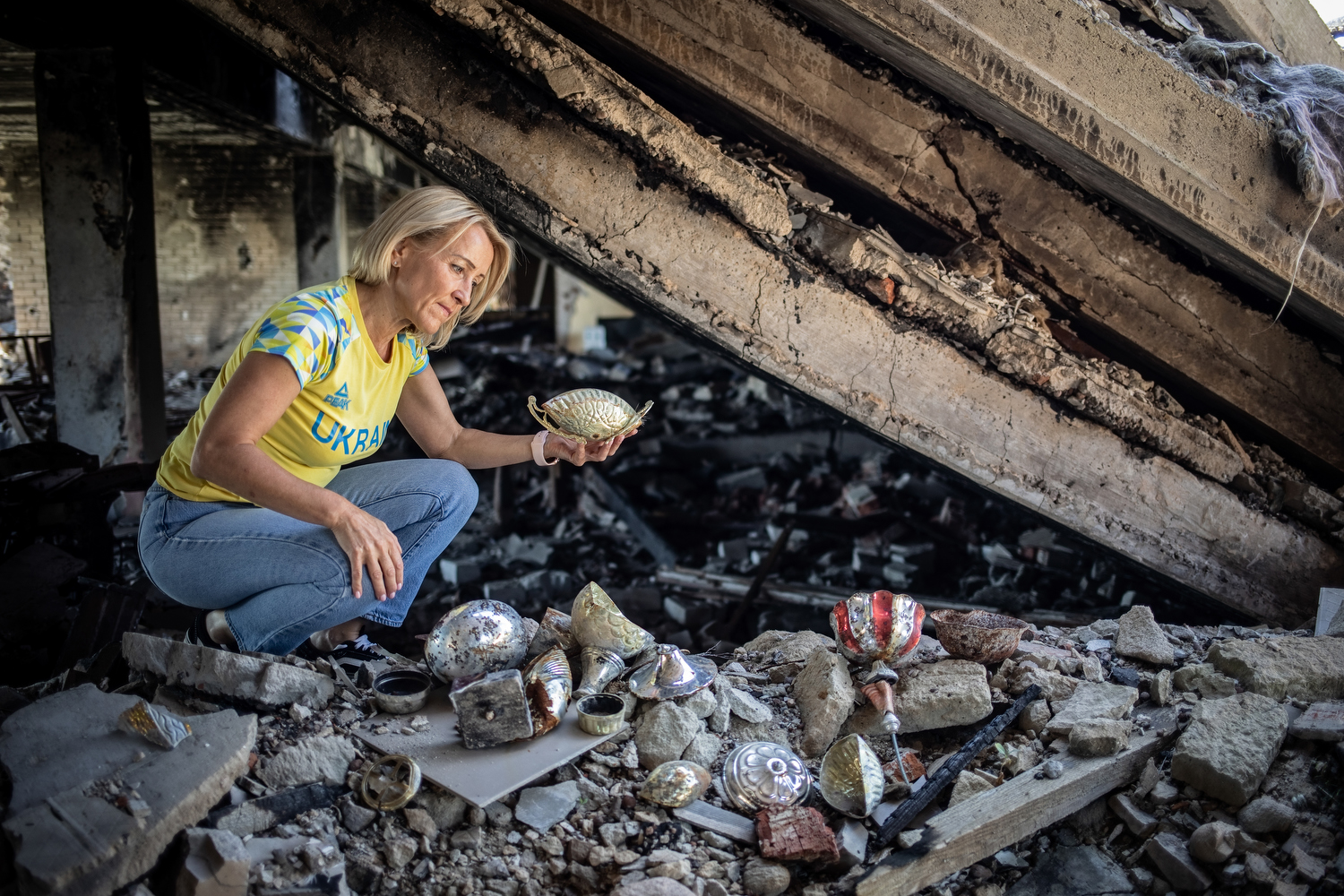
El gobierno ucraniano ha mantenido prácticamente intactas las ayudas, becas y permisos de viaje que se otorgan a los deportistas de equipos nacionales, priorizando un gasto importante en una economía de guerra donde, el gasto militar, consume la mayor parte de los recursos del país.
Apenas se han visto reducidos los presupuestos destinados a deporte de élite ante la gran oportunidad que representan las competiciones internacionales, y especialmente estos Juegos Olímpicos para visibilizar la lucha y la causa del pueblo ucraniano en su guerra contra Rusia.
El deporte ucraniano ha sido duramente golpeado por esta guerra. Según fuentes del Ministerio de Deportes y Juventud de Ucrania, desde el comienzo de la guerra hasta primeros de abril 2024, son más de 400 atletas, entrenadores, jueces y deportistas de nivel los que han perdido la vida. A la par, se calculan más de 350 instalaciones deportivas dañadas o destruidas en todo el país en los bombardeos por valor de 250 millones de € según el Gobierno de Ucrania. Cifras que aumentan con el paso de los días. La reciente resolución del Comité Olímpico Internacional (COI) da luz verde a la participación de atletas rusos y bielorrusos en los JJOO bajo bandera neutral, lo que ha desatado la indignación de la comunidad deportiva ucraniana que reclama el aislamiento de estos atletas como castigo a la invasión de su territorio.
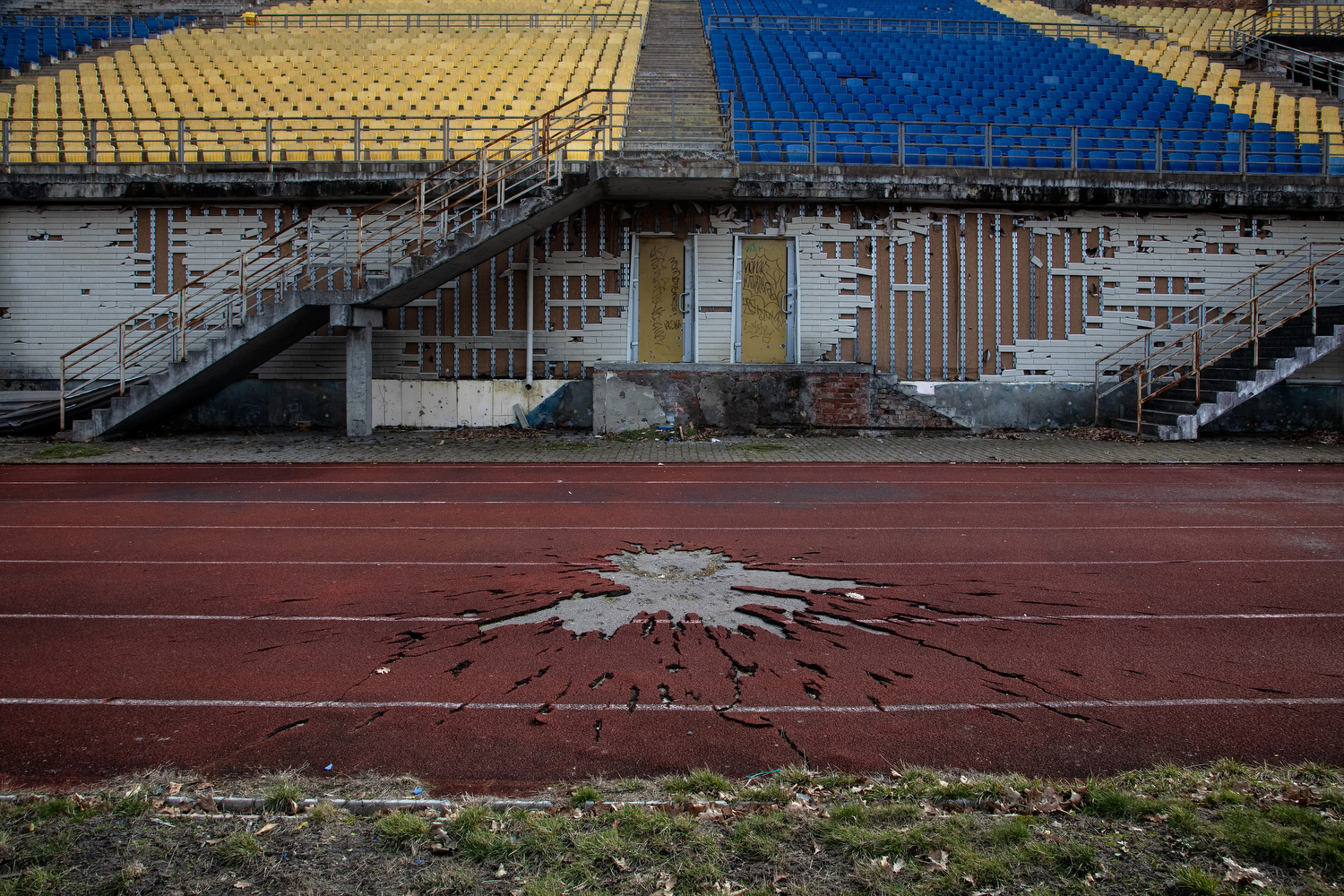
En este contexto, los protagonistas, los propios atletas han escogido diferentes maneras de continuar con su vida deportiva. Algunos han decidido entrenar en otros países lejos de las alarmas aéreas casi diarias. Es el caso del equipo Nacional de Remo, instalado desde enero hasta abril de 2024 en la localidad de Banyolas (Gerona). Otros huyeron al comienzo de la guerra, y con el paso del tiempo y la aparente estabilidad y normalidad con la que se vive en Kiev, han optado por volver y seguir sus entrenamientos cerca de sus familias. Algunos sienten que se soporta mejor la presión de entrenar bajo las alertas de fuego que pueden durar horas, que la incertidumbre de no conocer de primera mano lo que está pasando en tu hogar, cuando entrenas aislado en un país seguro.
Estos meses el Centro Olímpico de Kiev es un hervidero de atletas que entrenan y hasta viven largas temporadas en el centro. Con capacidad para casi 350 atletas, el presente y el futuro del deporte ucraniano dispone aquí de todas las instalaciones y recursos para ofrecer a sus atletas un lugar seguro y adecuado para entrenar. Aquí también entrenan los nuevos atletas que nos deja la guerra: los invictus warriors. Militares y veteranos de guerra heridos en el frente y que ahora, con sus graves secuelas a cuestas intentan encontrar una nueva motivación y sentido a sus vidas en el deporte paralímpico.
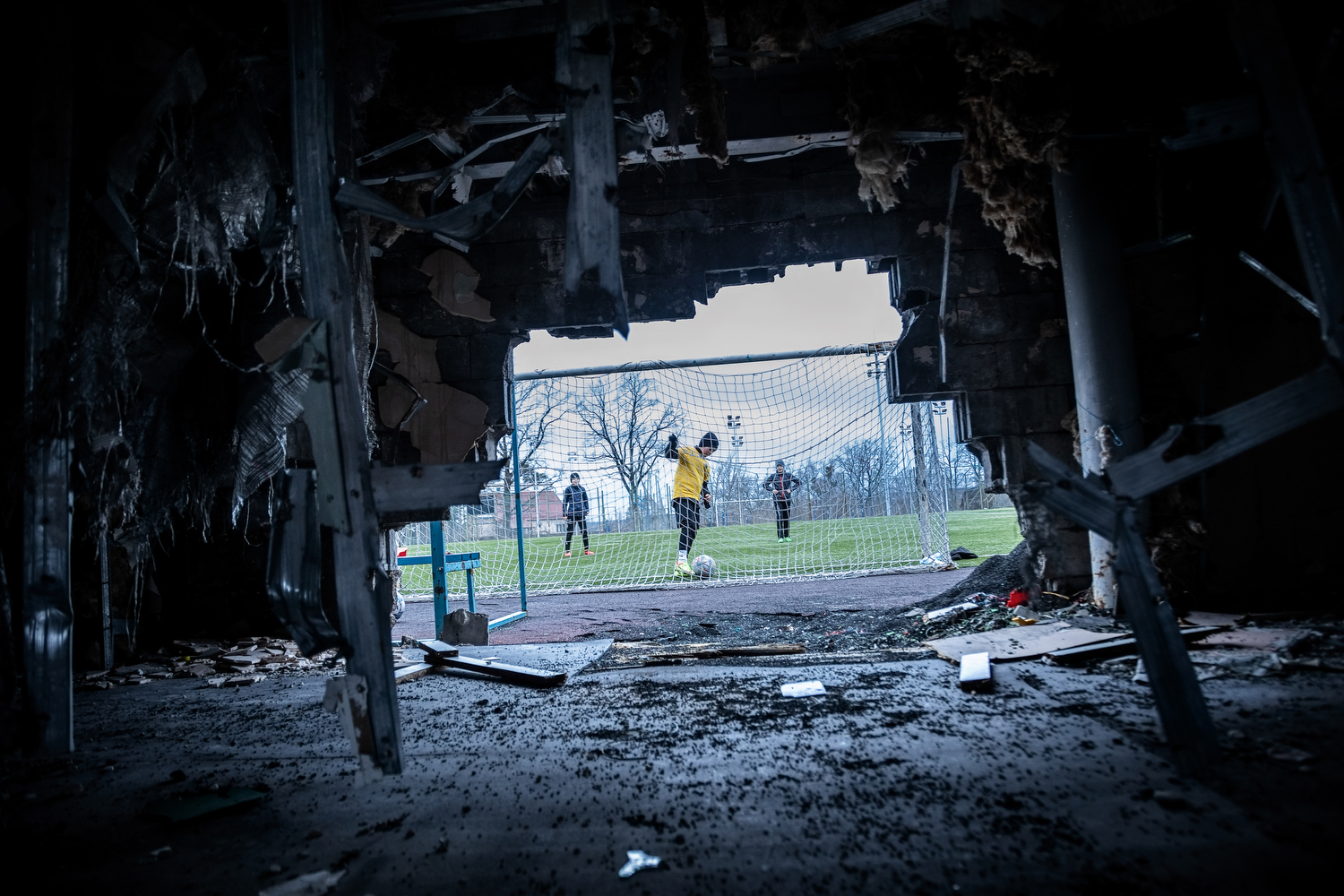
El deporte como oportunidad para rehacer vidas y también como herramienta geopolítica. El archiconocido lema olímpico “Citius, Altius, Fortius” (Más lejos, más alto, más fuerte) parece cobrar mas sentido que nunca en Ucrania. Los atletas ucranianos se convierten en embajadores de su país y su causa, en un amplificador que levanta la maltrecha moral de los soldados en el frente, que visibilice su causa y nos recuerde a todos la agresión que siguen sufriendo.
Este proyecto fotográfico ahonda en las historias personales de atletas, entrenadores y jueces ucranianos de élite así como sobre las consecuencias de la guerra en sus vidas. Recorre también parte de las instalaciones deportivas que han sido dañadas por los bombardeos rusos por todo el país, dando también cabida a los atletas INVICTUS (soldados heridos en combate y que ahora compiten en la modalidad paralímpica).
Esta publicación ha sido realizada con la ayuda financiera de la Unión Europea. El contenido de esta publicación es responsabilidad exclusiva de < Giron and Kolomiiets > y en ningún caso puede considerarse que refleja la posición de la Unión Europea.
Acerca de la Autora:
Susana Girón es una reconocida fotógrafa documental española, cuya trayectoria se caracteriza por la exploración de temas sociales y culturales a través de proyectos de largo recorrido. Representada por LE INSTITUT ARTS MANAGEMENT en Estados Unidos, su trabajo ha sido publicado en medios internacionales como National Geographic, The New York Times, y Der Spiegel, entre otros. Además, es miembro de la plataforma WOMENPHOTOGRAPH y del colectivo COVID PHOTO DIARIES, lo que subraya su compromiso con la narración de historias visuales.
Girón ha obtenido diversos reconocimientos a lo largo de su carrera, incluyendo nominaciones al prestigioso premio de fotografía Leica Oskar Barnack en 2020 y 2023, y ha sido galardonada con premios como el DKV de Fotografía en 2022 y el Primer Premio en el Atlanta Photojournalism Award en 2020. Su obra ha sido destacada en exposiciones individuales y colectivas en Europa y América Latina, y en festivales fotográficos como el Helsinki Photo Festival y el Head On Photo Festival en Sídney.
La formación académica de Susana es destacada, con estudios en fotografía y artes visuales en la Universidad Miguel Hernández, así como en gestión cultural en la Universidad Pablo de Olavide. Ha participado en residencias artísticas como ART RESIDENCE ALEY en Beirut y ha complementado su formación con workshops de fotógrafos internacionales.
Como docente, ha compartido su experiencia en instituciones como EFTI en Madrid y PIC.A PhotoEspaña Alcobendas, y ha impartido conferencias y talleres en universidades españolas. También ha sido jurado en prestigiosos concursos de fotografía, reafirmando su influencia y dedicación al campo del fotoperiodismo y la fotografía documental.
Links:



